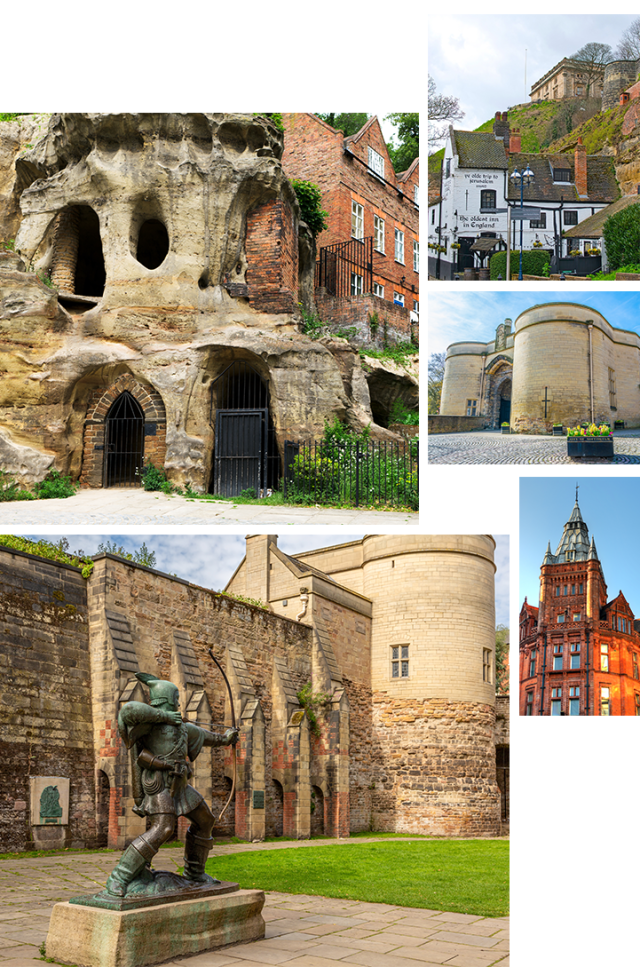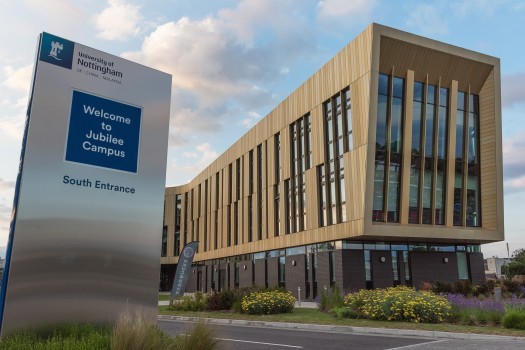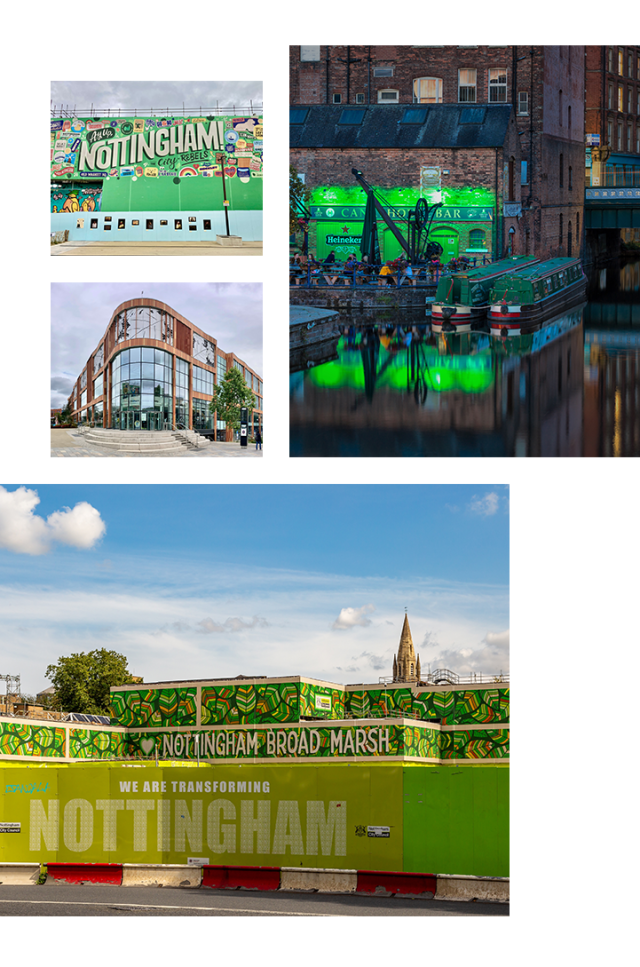Search Listings
Search Listings

Home to the famous legend of Robin Hood, Nottingham’s story far extends the beloved outlaw, attracting both tourists and students alike with its diverse offerings.
Today the modern city blends its extensive history with vibrant cultural events. With Nottingham setting the earliest UK Net Zero target for 2028, the city is currently undergoing significant economic redevelopment, presenting itself as a considerable commercial opportunity.

For a manufacturing city that rapidly developed during the Industrial Revolution, Nottingham is unique in having an equally rich pre-industrial history dating back 1,000 years, originally known as Snotengaham back in the 6th century.
Nottingham Castle was constructed shortly after William the Conqueror's invasion, initially starting as a wooden motte-and-bailey structure. Over the centuries, it has witnessed pivotal events, from Richard the Lionheart's battle with his brother John to its partial burning during the 1831 Reform Bill riots.
Following its recent £31m redevelopment, Nottingham Castle offers engaging activities for visitors of all ages, including its museum, galleries, exhibitions, and cave tours.
Also known as the City of Caves, Nottingham's numerous caverns have long been a defining feature of the region, with the city referred to as Tig Guocobauc (House of Caves) in Welsh Anglo-Saxon as early as the 9th century.
Boasting over 800 today, it remains the city with the most manmade caves and over the centuries they have served countless purposes, from hosting the plotting of Edward II's death to functioning as tanneries during the Industrial Revolution, as well as acting as air raid shelters during WWII.
Despite most of the caves being privately owned, several tours are available, each offering unique experiences that highlight the diverse uses of these caverns.
During the Industrial Revolution, as the demand for lace increased, Nottingham became a leading hub for lace production due to its pioneering industrial innovations and skilled workforce.
However, the city faced severe overcrowding within its constricting medieval layout, housing some of Europe's worst slums where diseases were rampant and residents often resorted to living in the caves. Conditions slowly began to improve when public health reforms and urban redevelopment efforts came into play across the mid to late 1800’s.

While Nottingham may no longer host Robin Hood and his merry men running from the evil sheriff, visitors can immerse themselves in the legend with the award-winning Robin Hood Town Tour. One of the tour’s highlights is Ye Olde Trip to Jerusalem, claimed to be the nation’s oldest inn established in 1189 AD, where Richard the Lionheart is said to have gathered with his men before heading to the Crusades.
The Lace Market area, Nottingham's oldest district, was once the heart of the city's lace industry, characterised by its intricate red-brick Victorian warehouses. Today the area has been transformed into a vibrant and trendy quarter featuring chic bars and restaurants, perfectly showcasing how Nottingham blends old with new. Some of the area’s attractions include the National Justice Museum and the Nottingham Contemporary art gallery.
The city’s historical heritage is further celebrated with the annual Nottingham Goose Fair, Europe’s oldest travelling market, first held in 1284. Nottingham also boasts a vibrant theatre scene including the Theatre Royal, first built in 1865 and showcasing grand Victorian architecture, and the adjacent Royal Concert Hall, renowned for its visual and acoustic design.
Home to the University of Nottingham and Nottingham Trent University, the city enjoys a vibrant student population, with approximately one in seven residents—65,000 out of 345,000 enrolled in higher education. This contributes to its lively nightlife and the highest proportion of student housing in the country, as one in every 13 homes is dedicated to pupils.
The city’s youthful demographic is highlighted by its average age of 31, the lowest in the East Midlands compared to the national average of 40, while the working-age population constitutes 70% of the total population.
Located in the East Midlands, Nottingham is conveniently situated within a four-hour reach of 77% of the UK’s population. This central positioning provides businesses with excellent accessibility, efficient logistics, and a vast talent pool, making it an ideal location for operations and growth.
A unique aspect of the city is that it features the highest proportion of residents, at 42%, that live within a 15-minute commute of 5,000 jobs via public transport. The city’s fantastic network system comprises of the Nottingham Express Transit (NET) tram system, two rail services, and the greenest bus network in the country, supporting plans to reach the city’s 2028 Net Zero goal.

Outlined in Nottingham’s July 2024 economic plan for growth, the city’s economy is worth approximately £11 billion, rendering it as the East Midlands financial hub and largest city.
The two Nottingham universities contribute a combined total of £3.8 billion to the economy annually, accounting for 14% of the local economy. Their impact includes creating 25,000 jobs, fostering over 700 new enterprises through programmes, and enhancing the area’s top-tier research capabilities.
Overall the city has an above average rate of business births and below average rate of business deaths in comparison to national figures. Some of its sector strengths include Creative and Digital Industries, Health and Life Sciences, Low Carbon and Clean Technology, and Advanced Manufacturing. Additionally it hosts the headquarters of a number of major businesses such as Boots, Experian, E.ON, Capital One and Games Workshop.
Nottingham's appeal as a desirable destination is underscored by an estimated 10.8 million day visitors in 2022, where 85% of the 1.93 million tickets sold by the city's arts and culture venues were purchased by visitors from outside the city.

Of Nottingham’s ambitious £4billion development plan, the city centre offers a total of £2 billion in current investment prospects, emphasising the city's ongoing regeneration and economic significance.
The two of the biggest projects, significant on a regional level, include Broad Marsh and The Island Quarter that together would deliver over 7,000 new homes, 15,000 new jobs, and generate 2 million square feet of office and commercial space.
Broad Marsh is a major urban regeneration project, transforming 20 acres of land in the south central business district to provide innovative new spaces, including a new car park, bus station, Nottingham Central Library, and the Nottingham College City Hub.
The Island Quarter, instead, is a 36-acre project in revitalising a long-derelict site into a mixed-use hub. With Phase one of the plan having already won awards for its design, it includes new residential apartments, high-quality office space, creative and retail areas, a lifestyle hotel, and vibrant public spaces, such as a linear park.
Our team
We're proud to employ more than 450 talented individuals working across a multitude of disciplines.
Office finder
Eddisons is rapidly growing; emphasised by our nationwide network of 30 offices across the UK.
Contact us
We're ready to take your call and can quickly pass you through to the right department.
Newsletter
Join thousands of property managers, occupiers, landlords and investors receiving the latest insights.
Local office finder
Eddisons boasts a national presence, with offices located throughout the UK.
Discover your nearest one today.
Find Your Office
Contact details
2nd Floor, 10 Wellington Place, Leeds, LS1 4AP
This site uses cookies to monitor site performance and provide a more responsive and personalised experience. You must agree to our use of certain cookies. For more information on how we use and manage cookies, please read our Privacy Policy.